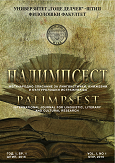THE ABSENT AND THE OTHER IN THE LAND OF THE REFUGEES
DOI:
https://doi.org/10.46763/PALIM2491895kAbstract
The theme of exile and displacement is increasingly present in contemporary world literature. The reason for that is due to the political developments due to which homelessness became a general phenomenon from the 20th century onwards. A proof of this is the histories of some communities where collective traumas have led to expatriation, leaving members of those communities stateless. In the Macedonian case, such a collective trauma from recent Macedonian history is the forced exile and displacement of Macedonians from Aegean Macedonia, who were forcibly exiled and displaced during the Civil War in Greece. This historical reality created a special thematic entity in contemporary Macedonian literature known as the Aegean theme. The novel “Land of Refugees” (2018) by Kitsa Kolbe is the literary testament of the Aegean refugees, the literary testament of all refugees around the world, who have been persecuted, rejected, defected, and humiliated. The specificity of this novel is that the world of refugees is given from the perspective of children's eyes, through the children's understanding of the world of adults and all the challenges, trials and problems they go through. It is Frose, the first child born after the escape, the little pup that grew up prematurely and from a very young age became aware that if only one remembers, nothing is lost. In this way, through a post-memory appropriation of the memory, she makes a transgenerational connection. Her memory of the joyous childhood serves as a form of catharsis, enabling her to decipher the Absent, and ultimately overcome the fear of the Stranger.
Keywords: exile; persecution; home; housing; foreign; absent.


